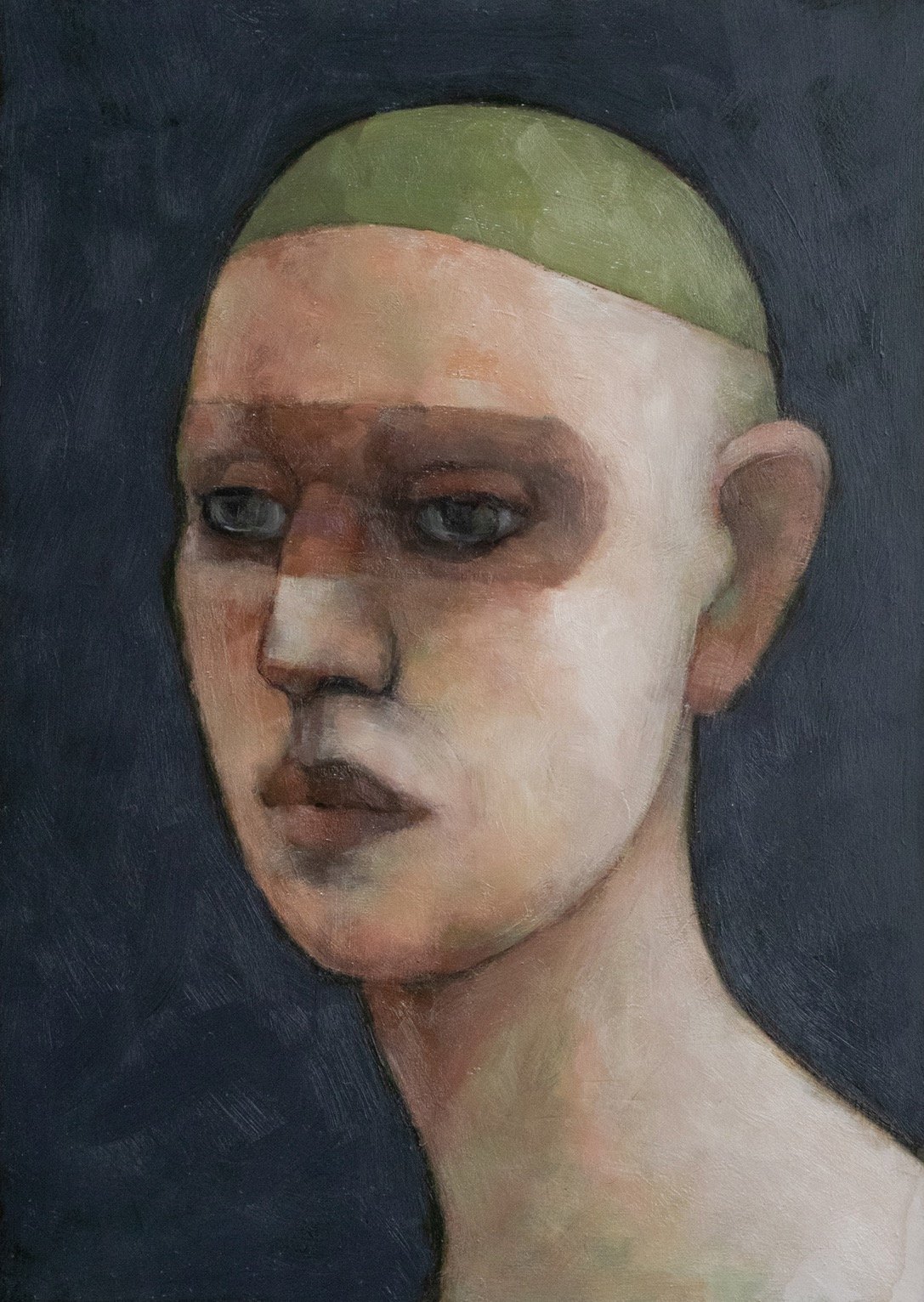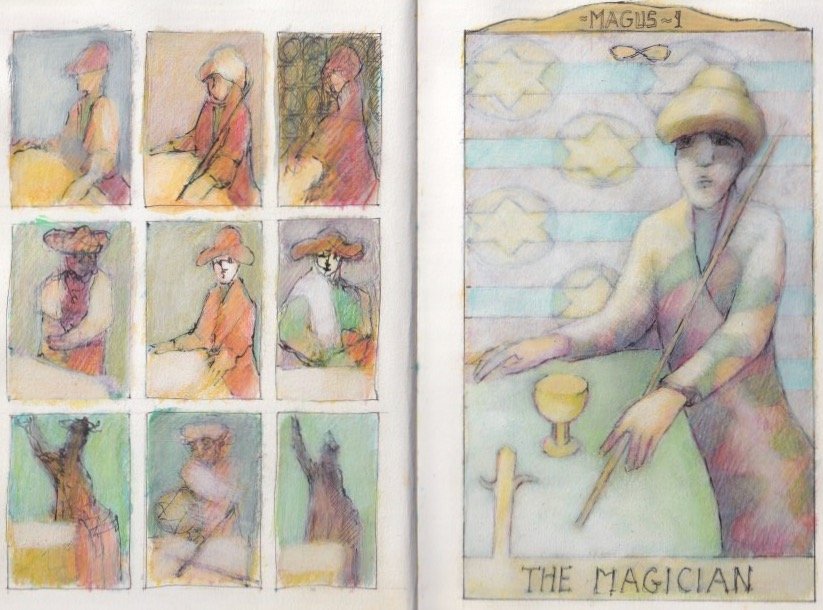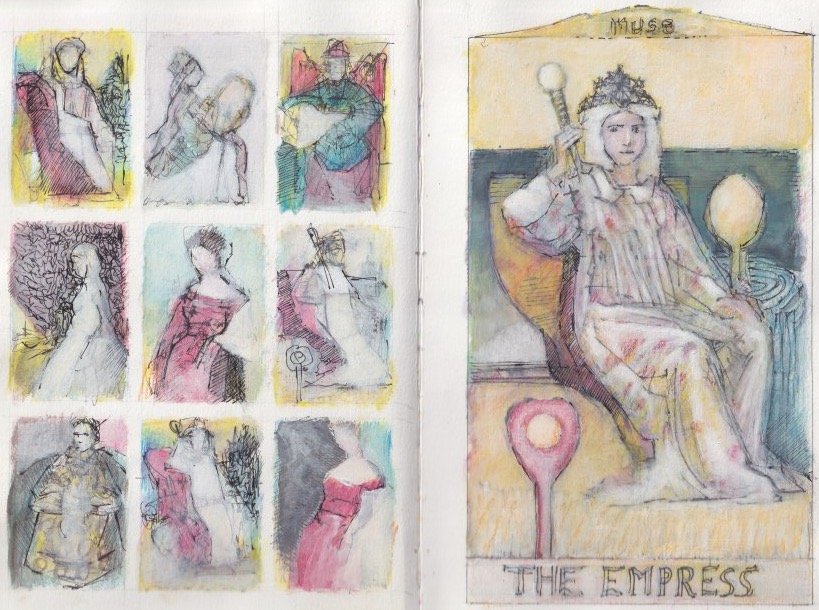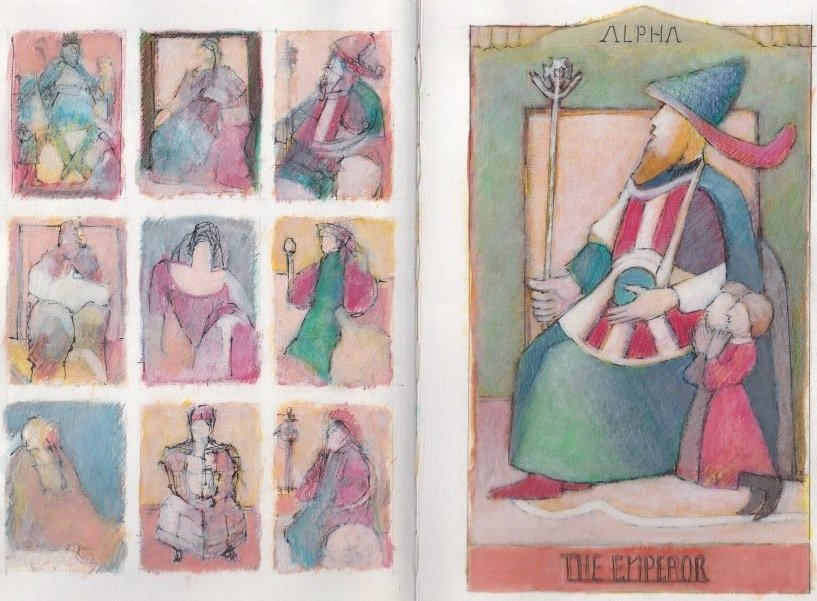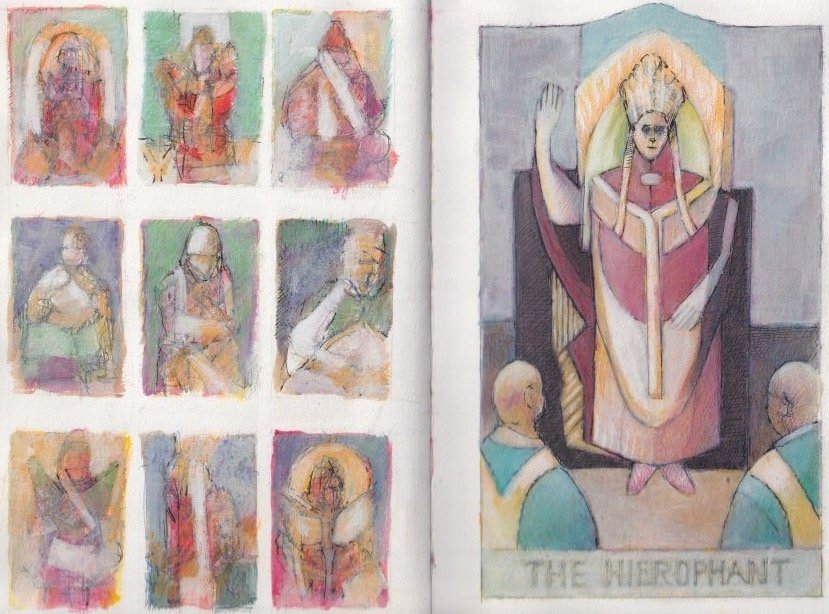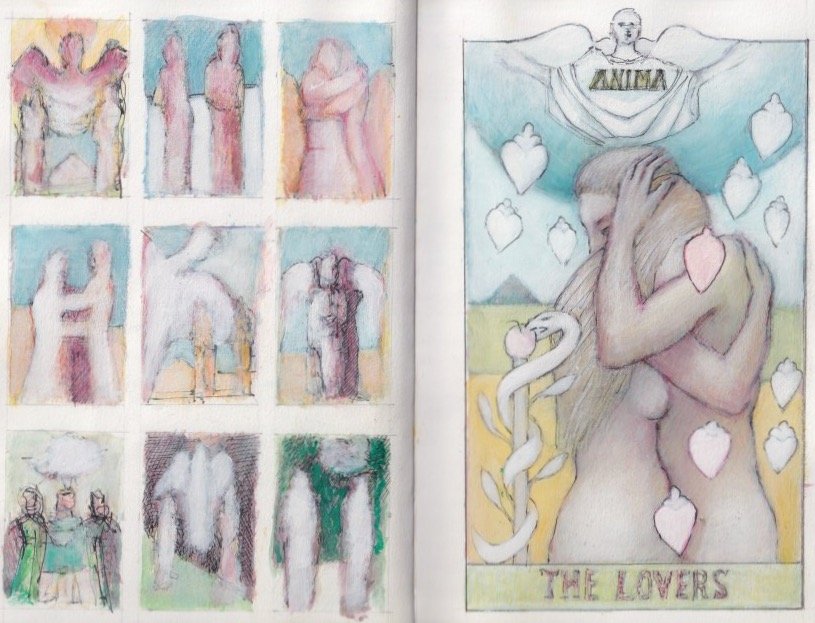Prologue
The Wounded Fool is the story of a restless, curious, and troubled soul searching for “the miraculous” without knowing what that might mean. He stumbles, falters, and hesitates, yet continues. Along the way, he encounters figures of wisdom and power, faces his shadow, and learns what it means to be both broken and whole.
In the end, he discovers “the miraculous” hiding in plain sight.
The Fool’s journey is not unique. It is our journey too. His wounds are ours: the scars of love and loss, the weight of history, the ache of isolation, the hunger for meaning. To follow his story is to follow our own - to trace the same longing that has carried human beings through mythologies, civilizations, and dreams for millennia.
What lies ahead is not instruction, but reflection. The unfolding story told through words and images is a mirror. You may find traces of yourself in its timeless narrative. You may recognize your own foolishness, you may recognize your own wisdom.
You may even encounter the miraculous.
0. The Fool
It is the Fool's destiny to go in search of himself - an adventure he undertakes with the naïveté of one who carries a wound older than memory.
The thin-skinned Fool is saturated with the mystery of life. His misfortune lies in being too tuned in to the inner life of others. He feels the frequencies of their insecurities and senses the drift of shadows behind their masks. At any moment, he suffers a quiet restlessness - craving approval while fearing the real and imagined judgments of those unsettled by his perceptions.
To manage his unease, the Fool retreats into fantasy, where his distracted instincts are endlessly waylaid. He opens the doors of desire as though they were gates to freedom. He splits from his spirit and lives in his head, exiled from the ripening moment of the heart. As his attention turns inwards, the splendor of the world fades from his awareness.
Already abandoned, the Fool abandons himself and becomes an outsider - a reject from the manufacturers, searching for an elixir to gratify the ego and eradicate the angst. With intoxicated instincts, he navigates as a people-pleaser, a tourist without a map, suspecting all the while that some secret of survival lies beyond his grasp.
In his self-reliance, the Fool flounders like an ordinary god bereft of the power to create. He talks incessantly and fails to tame the stray ideas in his head. Human contact makes him nervous, certainties recede, and a rising unease sharpens his shame and provokes his defiance.
As his paranoid lucidity dims the daylight, the streets narrow with danger. Around each corner lurks a spectre. Way past midnight, the Fool wakes from a recurring dream in which he had murdered someone whose name he can't recall.
He flees the city and seeks refuge by the ocean - only to encounter an isolation where menace stirs the air. In this newfound seclusion, disturbing visions become voices in his head. The voices rise in a chorus of accusation. He shouts to silence them. But they continue...
On a cliff of extinction, he edges toward oblivion, daring the bitter wind and the blackened rocks of a violent sea. Suddenly, he breaks - like a terrified soldier in the trenches - and his frenzied prayer flaps into the ether.
In this surrender, his identity is discarded like a useless rag, and he is momentarily released from every illusion of importance. Instantly, he is a nerve-end of God - a minuscule spark of consciousness encountering the anima in the jungle of the id. The Fool glimpses the miraculous in the yearning energy of trees and the symphony of sunsets. In that glimmer of clarity, he grasps that reality can only be exactly as it is - not his to alter, but only to accept. Like a returning salmon, the Fool’s ultimate destination is the source: the fountain of enlightenment, the higher Self.
He consults psychologists and scours libraries for the secrets of sanity - or at least, a diagram of the maze. But for the Fool, the formulas of others are as elegant and useless as the opening moves in a familiar game of chess. It occurs to him that he must follow the curve of his curiosity and surrender to whatever experiences an alternative life might bring.
For this new adventure, the Fool chooses the guise of a vagabond outcast - a figure stripped of belonging, answerable to no institution, indebted to no system. As a drifter, he may overcome the conditioning of his culture and gain distance from his past. Then, like a luck-struck gambler trusting the roll of the dice, the Fool decides to trust the universe and place his unravelling life on the altar of chance.
1. The Magician
At the table sits the Magician - an illusionist who manipulates the levers of perception and sidelines the rational, making the invisible visible.
With mesmerizing movements, he flourishes the signs and symbols of desire: wands for power, swords for truth, cups for emotion, pentacles for possession. In a performance that reveals absolutes his followers had never dared imagine; the Magician awakens their quiescent dreams as visions in the glimmering air - air he breathes as though it were the breath of God.
Among the Fool’s delusions is a Messiah complex: a fantasy in which he heals the multitudes, evangelizes from the rock of ages, and basks in the adoration of his flock. He recognizes in the Magician’s craft the possibility of performing miracles - or at least, the illusion of miracles. In the déjà vu of self-fulfilling certainty, the Fool decides that his life’s purpose is to become a master of illusion, and that the Magician is the one he must become.
To this end, the Fool ingratiates himself with the Magician. He acquires a wand, a hat, a rabbit, and a dove. Through endless hours of practice, he makes the bewildered animals vanish and reappear from the ether. He mimics the Magician’s manner, accent, and affectations. As his determination and sycophancy gain his mentor’s attention, the Fool’s delusions inflate. He soon regards himself as an exceptional apprentice - a chosen one among the Magician’s disciples.
In this first flush of success, it becomes imperative that the world acknowledge his uniqueness - a uniqueness that will shine in the superior staging of a sorcerer’s trick. He beseeches the Magician to share a dazzling secret of the clandestine craft. But the Magician counsels patience: “Make haste slowly. Do not want too much too soon. What is yours will come to you.” The apprenticeship, he explains, requires total command of the moment - and the long, repetitive road that accomplishment demands. Magic is an art that takes years of dedication and discipline.
But such patience lies beyond the frontiers of the Fool’s determination. He assumes his raw aptitude will suffice. Impetuously, he repackages old tricks and proclaims himself a magician. He summons an audience, arranges his new-fangled apparatus upon the table, and performs with the carnival confidence of a three-card trickster.
His act is received with the faint applause of spectators who have seen too many rabbits pulled out of hats. The feeble rattle of appreciation frustrates him. The Fool has anticipated an enthralled response, like the Magician’s performance invariably commands. In desperation he tries harder, but only stirs unease as his incompetence becomes painfully clear. The waning enthusiasm of the spectators saps his confidence. Anxiety unravels him. Abruptly, the Fool curtails his routine and retreats from the stage.
In the humiliating hindsight of defeat, the Fool begins to understand that the Magician disregards the highways of ambition or the podiums of validation. Behind the dexterity and deception, the Magician’s mind is still rather than striving, aware without deliberation, and at ease rather than at work. Such effortless attention enables an artifice where everything and nothing fades or finds form. An integrity is involved, which the Fool cannot fathom, and a genius, which he does not possess.
The Magician tells him: “Virtuosity cannot be induced. It arrives only through long engagement with the process from which artistry is shaped. Begin again at the birth canal. Locate the source of creativity. Seek the clarity of the High Priestess.”
2. The High Priestess
The High Priestess sits between pillars of initiation and reversal. Before her is the book of wisdom. Behind her is the unfathomable. Her mind is attuned to the oceanic impulse of creation, to the intention and source of her origins. Out of stillness and emptiness, her wisdom emerges as inspiration; inspiration she processes through reflection and renders into words.
In the ancient world, her visions are revered in the Temple of Solomon and at the Oracle of Delphi. Although men consult her about the future or the past, the aspiring man is often unmasked by her insight and torn by her veracity. Later she appears as Mary Magdalen, an inconvenient mystic whom the church fathers rebrand as a whore while they institutionalize the spiritual. Across the veneer of history her provenance fades, but her presence endures upon the side altar of the human psyche.
Masculine reasoning cannot map the labyrinth of her awareness - a sanctum resistant to the mythologies of theologians or the proclamations of philosophers. Yet the pathways to her wisdom are hidden in full view: in fossils of coincidence, in patterns and dreams discernible only through distance and memory, in the subtle mind of the heart, when the gross mind of the senses quietens and self-obsession withers on the vine of silence.
As he enters her temple, the High Priestess addresses the Fool in an ethereal voice that chimes like a thousand tinkling bells. He cannot tell whether she speaks from within his skull or through his ears. She tells him of empires that inflate and collapse like white dwarfs.
“You are nothing, and you are everything,” she whispers, her gaze tracing the shadows of a synthetic world stretched across her temple floor.
Abruptly, her ancient eyes lift and pierce the ether of his soul.
“Why are you here?”
“The Magician says I need clarity.”
“Clarity requires stillness,” she replies. “I will teach you to meditate.”
The Fool is animated by the prospect of illumination and listens to the High Priestess’s instruction with the zeal of a pilgrim witnessing an apparition. For as long as he can remember, his mind has been a circus of confusion - his thoughts and intuitions forever at odds, producing a turbulent cocktail of emotion and an inability to appraise any situation.
In preparation for enlightenment the Fool sits in the lotus position and discovers, despite his determination to be an outstanding meditator, that his mind is disturbed rather than serene.
Each thought that arises mushrooms darkly into a scenario of impending disaster,
or morphs into a re-enactment of some past humiliation. Soon he is besieged by memories he would rather forget and dire prospects he scrambles to avoid.
Undaunted, he persists - meditating morning, noon, and night at the feet of the High Priestess. But instead of basking in her venerable presence he sinks deeper into the swamp of his history and shivers in the fearsome winds of anticipation. His attempts to access intuition lead to superstition and his nervous system is eventually overcome with apprehension. What began in hope ends in failure. The Fool retreats from the torture chamber of his thoughts and abandons the hill of silence.
The High Priestess, meanwhile, regards him with an indifference that cuts deeper than any judgment.
“Why can I not find enlightenment?” he complains.
“You cannot be still,” replies the High Priestess. “Your natural rhythms are laced with trauma. Your anxiety floods the silence.”
“What must I do? I cannot continue like this!”
“To heal yourself,” she says, “you must secure the nurturing power of the world. Seek out the Empress.”
3. The Empress
The Empress sits in her garden - a paradise where the spiritual manifests as the physical. She generates the potent Spring where all is formed or stillborn, nurtured or neglected. Birth, sex, and beauty are her dominion and, in this fundamental expression of being, the Empress reciprocates life's longing for itself.
Throughout antiquity, she was a goddess with numerous titles. To the Athenians, she is Aphrodite, an enticer of gods and mortals; to the Romans, she is Venus, the mother of good fortune and fertility and the source of love, pleasure, and passion. She bequeaths creativity and resilience to the human enterprise and fosters the empathy and sensuality that sustains the individual. For the classical sculptor she is the muse who incorporates the inner and outer splendour of the world, and whose marble presence holds the poetry of the body and the eternity of the soul. Later, in the Renaissance, the Empress is idealized as the nurturing mother who manifests nature's abundance, beauty, and fertility.
Because she carries the life and first influences the child, the Empress supersedes the male. In her gift is the bond between mother and child, the meadow of belonging or the desert of isolation, the attachment or the void.
In the way a leaf absorbs sunlight and a bee is drawn to a flower, the passions of the Fool are inflamed by the Empress's perfection. Her magnetism sheens with its promise of happiness. Euphoric now with anticipation, the Fool crosses the garden to where the goddess sits upon her throne.
He arrives with his begging bowl of attachment and bares his woken anima before the Empress of his desire. Like a courting jungle bird, the Fool discards his inhibitions and squawks in anticipation of her touch; a touch that can unblock the sacral chakra of his bliss.
But in place of fulfilment, a nervous energy agitates the air. In a quicksilver moment, the Empress's tenderness evaporates. Her face becomes the face of every woman he has loved: caring one moment, withholding the next - her love contingent on his compliance, her affection withdrawn at crucial moments.
The Fool is seized by the vertigo of never knowing which version of her might appear - the warm embrace or the cold dismissal. She retreats and pursues. She gives generously and punishes with silence. Here, love is a weapon, and intimacy is a prison.
A stony ambivalence in the Empress’s eyes reminds the Fool of the woman who raised him. The Fool is distraught at this recognition as he realizes that he has been seeking her approval his entire life, chasing a reflection of the person who taught him that love requires self-abandonment - that his own desires are best suppressed.
His heart blackens in anger, not at the Empress, but at the dawning truth: he seeks a version of love that annihilates him. In every connection he seeks, he recreates the wound of his first relationship.
With a click of her fingers, the Shadow disappears, and now a maternal Empress sits on her throne observing him with the loving kindness of a mother who adores the nature of her child.
"Your shapeshifting is too much for me," the Fool protests. "I am seasick with confusion."
"What you seek in me is the reflection of your first relationship," the Empress explains. "You will unconsciously recreate that relationship in your life. If it were a nurturing bond, you would attract a loving partner. If it were a warped attachment, you would seek a counterfeit intimacy and lose yourself in the charm and chaos of others."
"What you say is disturbing," the Fool replies. "What am I to do?"
"The crucial relationship in your life is the one you have with yourself – the one you learned from your parents. Unless you accept their humanity, you will never forgive yourself," the Empress answers. "If you have a bewildering mother, you need an astute father. Visit the Emperor."
4. The Emperor
Within his fortress, encircled by symbols of authority, the Emperor reclines upon his throne and regards his subjects with the equilibrium of an alpha baboon surveying his harem. Implacable gatekeepers, sycophantic courtiers, battle-hardened generals, social climbers, deceitful petitioners, and scheming pretenders tread cautiously in his regal presence. The pecking order of this menagerie, separate from the feminine sphere and its cycle of birth and death, fortifies the structured world of masculine rule. Its objectives are permanence and conformity.
During his Capricornian ascent to the pinnacle of power, the Emperor discards his common identity, mythologizes his past, and sequesters an iconic name to secure his supremacy. He secures his kingdoms with an iron heart and a propensity for relentless attrition.
Order is preserved by his dark charisma. His scathing humour, random violence, and spontaneous benevolence keep the court on edge. While his narcissistic tirades about his achievements and his enemies appear to invite complicity and agreement, the courtiers have learned to respond with caution. Sometimes, declarations of loyalty - even their most personal acts of devotion - have triggered his suspicion. “Tell me more,” he growls on such occasions, encouraging their flattery to fuel his rage rather than stroke his ego.
The Fool enters the Emperor’s domain as a supplicant in search of an opportunity to fortify his masculinity and elevate his status. Because he is new to the court and carries an air of individuality, the Fool is met with curiosity as to how he may be useful for the schemes of others. The gates of ambition are open, and he surfs the stratum of influence which moves him closer to the throne.
Since childhood, the Fool’s intentions are misaligned with the territorial instinct of his gender. No parent imprinted an imperative of self-preservation on his psyche; nor has a mentor explained the loyalties, duplicities, and the strategies that define the human enterprise.
Instead, the Fool oscillates between meekness and hostility, only to become a convenient target in troubled times. He meanders like a discontented animal who fails to find his place within the pack, or distinguish between the minted and impoverished trails that map the migrations of the fraternity.
Also, the Fool has a significant weakness: he is blind to the hierarchies of power.
Following his defeat in the Oedipal struggle, a latent hostility towards his father is transferred onto authority figures. This juvenile defiance manifests as an automatic contempt for conventional ideas and customs that are not immediately gratifying.
Inevitably, the bureaucratic character of the court irritates the Fool. In an impetuous act of disrespect, he flaunts indifference towards the Emperor and makes no acknowledgment of the ascendency. Instead, the Fool focuses his attention and flattery on the courtiers who surround the throne and addresses them as though their standing was equal to the Imperial power they serve. But the Fool’s words fizzle in the ether as the court is silenced by a volatile glint in the Emperor’s gaze.
Instantly, the Fool regrets his audacity, which has placed him in great danger. A realignment in the sovereign mind can spark a lethal shift from the stability of protocol into the slaughterhouse of paranoia. The Imperial presence can uplift or destroy. The Fool senses the fury that forged the empire, and he understands, too late, that behind its ceremonial veneer, the court lives in fear of the Emperor’s vexation – a vexation which may cost him dearly.
In deathly silence, the Emperor considers the situation and finally laughs aloud at the quaking Fool who stands before him. Immediately the court erupts in hilarity.
“Only a Fool would risk the sovereign displeasure.” The Emperor declares. “We already have a jester in this court and have no use for another clown, especially one so arrogant. It is not influence or wealth you need to acquire, but the humility of a penitent. Go, seek the Hierophant.”
5. The Hierophant
Here is the Hierophant, the conductor of ceremonies from the naming to the grave. Inevitably a man, and frequently emasculated by holiness and an aversion towards intimacy.
This shaman-priest is a consequence of ephemerality and the human need for meaning. Communities conceive him to shepherd their souls along rugged paths to promised lands. Whether he is extracting human hearts upon an Aztec pyramid or banishing devils from a frenzied congregation, he lays claim to the bridge between Heaven and Earth. From this mythical overpass he monopolises the miraculous and intercedes with a volatile god.
At the core of his religion lies a mystery that only a Hierophant can understand. He trusts his proclamations because they aren’t his to begin with - they belong to a martyred prophet, the son of four fathers, who explained the moon.
The Hierophant gathers his flock from the pasture of gullibility and constructs cathedrals to house their superstitions. The cut of his costume advertises his eminence as the custodian of temples and the broker of salvation. On the expedition towards eternal life, he becomes the connoisseur of karma, propagator of guilt, savant of morality and warden of female fertility.
The Hierophant’s alliances are formed with regimes and autocrats for whom, in the battle for scarce resources, he emboldens the patriot and promotes ethnic cleansing. He sanctifies wars with the instruments of religion, crowns emperors, blesses governments, burns witches and forms inquisitions in a crusade to eradicate the nonconformist and purge the carnal woman.
At the palace of the priests, the Fool approaches the Hierophant.
“My arrogance is troublesome, and I wish to acquire the humility of a penitent. Can you show me, reverent one, how this can be done?”
Humility of a penitent!” The Hierophant laughs. “What century are you from?”
“I don’t understand.” The Fool replies. “I was told you teach humility.”
“Humility is redundant, and penance is passé in the commodified world.” Explains the Hierophant. “Mindfulness is what you need.”
“Mindfulness?”
“Yes. Mindfulness. Experience the present moment. That is exactly where everyone wants to be. The postmodern person avoids thinking of the past or the impending mass extinction. They consume, compare, and feel superior. They expect happiness.”
“What exactly are your teachings?” The Fool enquires. “Is there a moral aspect to all of this?”
“Morality is integral to the practice of mindfulness, but guilt about the past and fear of the future are no longer encouraged. We’ve moved beyond the Medieval. Heretics are cancelled, rather than burnt. No one gets triggered, and everyone feels safe. We promote celebrity rather than sainthood. Look good, feel good, do good. Visible philanthropy is a sacrament.”
“So, what should I seek?”
“Abundance.”
“Abundance?”
“Abundance is where it’s at in this age of personal fulfilment and emotional security. Forget about humility and focus on your unique individual self.”
The Fool follows the Hierophant’s directions and focuses on his thoughts and feelings. He enters a meditative state and visualizes an ideal life as a prosperous celebrity. With all the mindfulness he can muster, the Fool releases his desires into the ether and wills the universe to manifest his vision of abundance.
Time passes and nothing happens. The Fool wonders why the universe is ignoring him.
“It’s a lack of trust on your part.” The Hierophant explains. “Or else your attention is dulled by the dopamine fog of the digital world.”
“I rarely use technology.” The Fool replies. “I will focus on trusting.”
Despite his most passionate attempts to totally trust the universal mind, his vision fails to materialize. He imagines and reimagines until his efforts finally exhaust him and the Fool despairs of ever being an abundant individual.
“Why doesn’t life work for me?” He demands. “What am I to do?”
“You do not possess the gift of faith.” The Hierophant declares. “Maybe, before you can trust the universe, you need to trust another human being. Ask the Lovers how they trust.”
6. The Lovers
Here is the end of innocence, the apple eaten, the knowledge gained, and the paradise lost. In forsaking Eden, the Lovers’ choice is motivated by the desire for individuality - by a wish to detach from universal consciousness and enter into the world of the human ego.
But this transition into being comes with a price: the awareness of an inner and outer duality. Now, separated from the Higher I, each is a solitary entity at the centre of their own universe, separate from the other and from nature. The Lovers experience a fundamental anxiety as they encounter the reality of survival, aloneness, and inevitable death in an alien world.
To escape the isolation and withstand their fear, they seek connection. The Lovers reach for each other and discover love.
In the serpent dream of human gratification, a potent appetite arouses every cell when the naked lovers embrace. Each caress is an act of adoration, scent and taste are intoxicating, every glance is a secret shared, the eyes are wells of revelation, and the sounds of love ascend with abandon. With their passion confirmed, the Lovers reach deeper than touch and into the heart of belonging until, in a surge of delight, their energies flower and momentarily merge into the bliss they had known in the garden.
Within this rapture, each is the other but doesn’t know it.
The Lovers begin in love by falling - not for the other but for the self. The person they fall in love with is strangely familiar because in each other they have found scaffolding on which to screen the anima and animus - their prototype of perfection, the aura of their souls. Thus, the Lovers are enraptured with the perfection of the beloved, and while love emboldens the hero and inspires the heroine, everything seems possible.
However, in their brave new world, where nothing can exist without an opposite, the pillars of euphoric certainty cast shadows of anguish and abandonment. With time, the infatuation with the “love object” evaporates, and when the inner nature of the other becomes apparent, the relationship ripens or perishes. The first love becomes a second birth: a mystical marriage for the fortunate or, for the unlucky, a misadventure into a bitter Jerusalem where the jilted lover carries the cross of longing - a longing that will emerge as melancholy in music, haunt the drawn line of beauty, linger in the soul of poetry and resonate with the Fool.
In the way he fears his own fragility the Fool fears love. A life of broken promises and severed boundaries has closed his heart. Intimacy, for the Fool, is a harbinger of hurt and a prospect of further rejection. Only when he is stirred by obsession, disinhibited by addiction or mindless with lust will he risk a relationship – a relationship bereft of empathy and pursued with the duplicity of seduction. The Fool sees sexuality as an instrument of conquest and a sedation of longing, rather than the celebration of a precious bond. The fantasy self he champions slowly poisons all possibility until his replica romance is skinned with resentment and ends in disillusionment.
“Why do my relationships die?” The Fool asks the Lovers.
“You have never known or practiced loving. You act out of an injured pride that can only take and never receive,” the Lovers answer. “You will not know love until you know yourself. And to know yourself, you must assimilate the contradictory voices and opposing appetites of your being.”
“And how do I do that?” The Fool demands.
“Seek the Chariot,” the Lovers reply.” “The condition of the Chariot you find will be the condition of the life that you live.”
